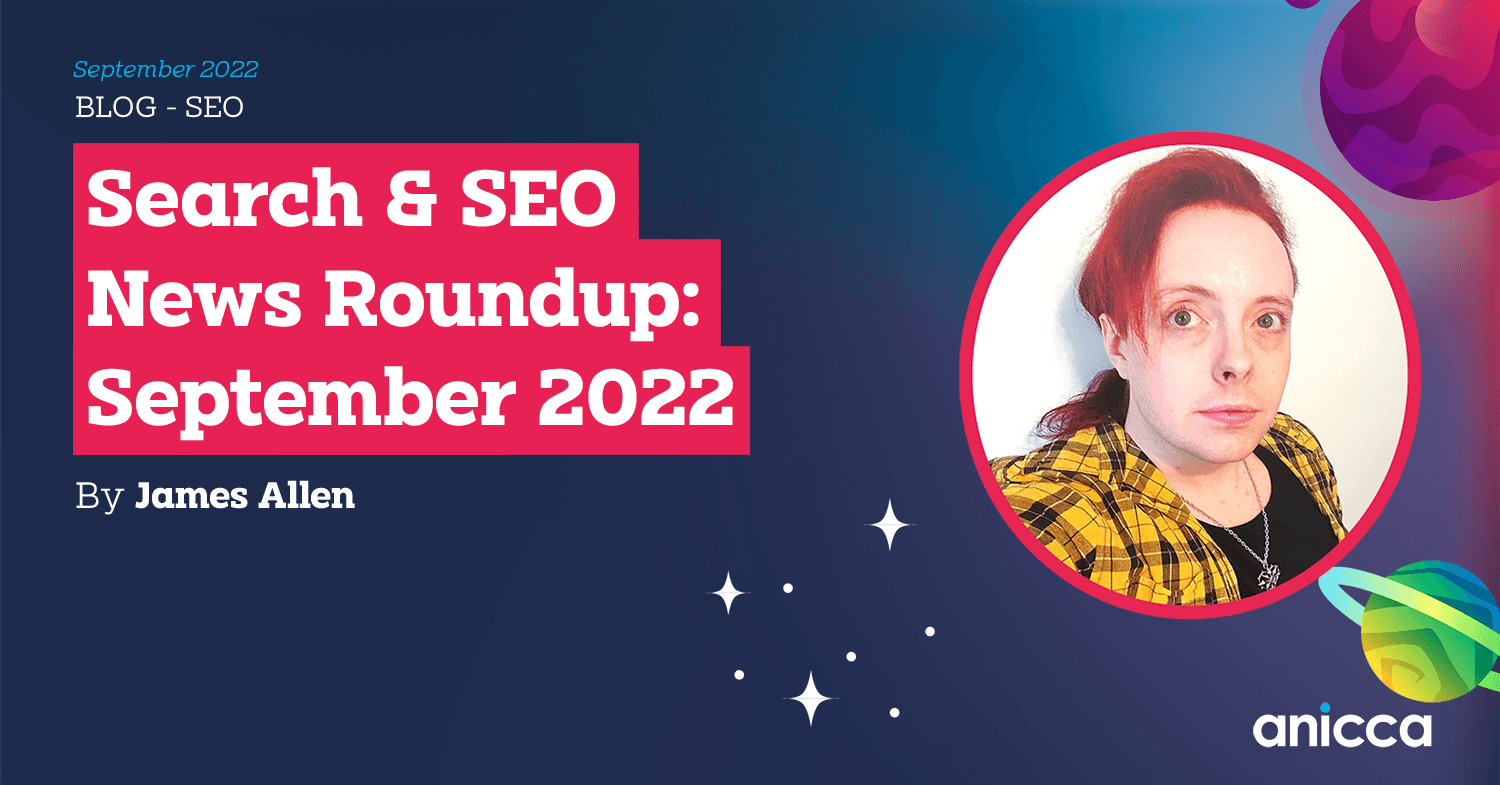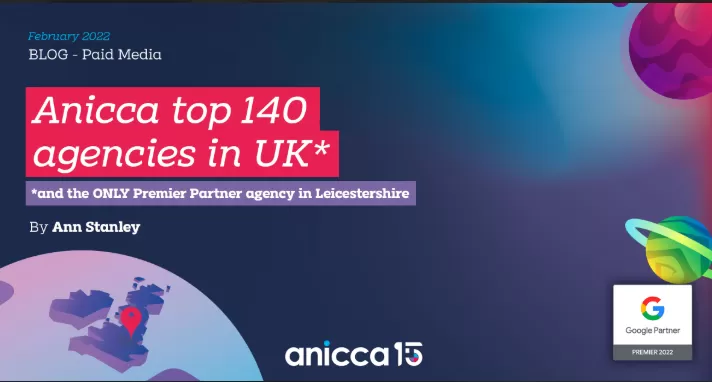Search & SEO News Roundup September 2022

Latest search and SEO news from September 2022. Search on Showcase updates from Google, Google Ads issues, Google PID removal features and more.
During September 2022, these are the main news items and updates:
- Search on Showcase: Google Maps Neighbourhood ‘Vibes’ and More
- Search on Showcase: Multisearch and Other Changes
- Latency Issues Affecting Google Ads
- Google: Keyword Stuffed URLs Don’t Result in a Penalty
- Product Reviews Rollout Complete (EN Only)
- TikTok Enable Further Optimisation via Video Description Limit Increase
- Google Now Allows PID (Personally Identifiable Data) Removal Requests
Some news which we discussed in previous posts (product reviews rollout, TikTok as a search engine) is capitalised upon within this post. There are also a lot of new insights from Google’s Search on Showcase, as well as some recently described issues with Google Ads.
Search on Showcase: Google Maps Neighbourhood ‘Vibes’ and More
Posted September 29th 2022 on Techradar
Google have revealed a plethora of new search features for Google Maps at their recent Search on Showcase. One interesting new feature is ‘vibe’ for neighbourhoods. You’ll soon be able to tap an area on Google maps, and see all the top-rated locations within that specified locale. For those who prefer to decide on a destination first and then work out the specifics later, this will be a really interesting and useful new addition.
Other supplementary information (weather, traffic density) may also be supplied. It would be interesting if Google also chose to deploy local crime-rate stats and things of that nature. Performing a ‘vibe check’ before you visit a new area, could soon become second nature.

This could impact local businesses by drawing Google users to more popular areas. An area with higher rated shops, restaurants and attractions could see more footfall than low-rated areas. It’s interesting to consider the potential social and economic implications of a change like this – how could underperforming neighbourhoods be affected?
Main takeaway: this new feature has not been released yet. Once it is, this change could impact certain businesses which require footfall to turn a profit. If more users visit high-performing neighbourhoods (as they have more to offer), will underperforming neighbourhoods suffer? Something to think about, though the change in human behaviour may only be slight. Time will tell.
Search on Showcase: Multisearch and Other Changes
Posted September 29th 2022 on Techradar
Here we explore some interesting information from the Search on Showcase. The most interesting proposed feature is ‘multisearch’, which will allow users to search utilising multiple simultaneous inputs (for example, an image alongside a text query).
For example:

Users will be able to ‘add’ to their search using different search input mediums. In the above illustration, you can see that someone has searched by image, the user has then proceeded to add a snippet of text.
Other changes which Google are proposing relate to Maps (previously covered in this post) and product searches. Clearly there are some big changes coming from a UX perspective.
Main takeaway: large feature changes and additions are coming to Google. These will change the ways in which users search. For now, there’s really no way to tell how search will be impacted. Users may combine input mediums in order to process search queries.
Latency Issues Affecting Google Ads
Posted September 29th 2022 on SEO Roundtable
If you have been logging in to Google Ads lately to manage your ads, and the platform seems unstable – you aren’t alone!
This information comes from SEO Roundtable and cites quotes from Google:
“Google Ads continues to suffer from ongoing latency issues – mostly from the Google Ads console. This is the place advertisers go in and manage their ads. It has become a joke about how the console can slow down and become almost unusable.
Just last night, Google posted a confirmed issue in the Google Ads Status Dashboard confirming another issue. Google wrote: ‘We’re investigating reports of an issue with Google Ads. We will provide more information shortly. The affected users are able to access Google Ads, but are seeing error messages, high latency, and/or other unexpected behaviour. The Google Ads API is experiencing an increase in latency and an increase in connection resets after about 10 minutes. We are actively investigating the issue.’
Then a few hours later, Google said it was fixed for most users but not all but that Google won’t be updating us on when it is fixed for all. Google wrote: ‘The problem with Google Ads should be resolved for the vast majority of affected users. We will continue to work towards restoring service for the remaining affected users, but no further updates will be added to this dashboard. The affected users are able to access Google Ads, but are seeing error messages, high latency, and/or other unexpected behaviour.’
Google are clearly working on fixes for those affected.
Main takeaway: check in with your PPC / Google Ads specialist. It’s possible that some of your campaign management may have been affected by these issues.
Google: Keyword Stuffed URLs Don’t Result in a Penalty
Posted September 27th 2022 on SEO Roundtable
We all know that keyword stuffing within user-visible content can lead to search ranking devaluations. Although that is true, apparently URL strings aren’t subject to these same stringent checks (probably because, on the modern web, users don’t usually bother to check or interpret URL strings).
Here is a link to John Mueller’s tweet:
https://twitter.com/JohnMu/status/1572586534691549184
He states:
“No, you won’t get penalized for keyword-stuffed URLs. It basically has no effect, positive or negative for search engines. It’s a good practice to mention your keywords in the URL, but the effect is minimal. Focusing there is often the wrong prioritization.”
If you are thinking that now might be a good time to engage in keyword stuffing for your site’s URLs, you are wrong. John Mueller clearly says “It basically has no effect, positive or negative for search engines”. In essence, this means that Google has largely devalued the text within URL strings. In 2022, they aren’t a major factor.
Be careful with how you interpret this. User-visible content (body content, headings etc) should still be optimised to an appropriate level. Keyword stuffing within user-visible content is not advised (though strategic keyword placements should still be employed).
Main takeaway: don’t worry if some of your URLs are keyword-stuffed. Equally, don’t add to the problem by stuffing more of your URLs full of keywords. Content should still contain tactically employed keywords (without deploying keyword-stuffing).
Product Reviews Rollout Complete
Posted September 27th 2022 on Search Engine Land
Within our prior August 2022 Search Roundup, we referenced Google’s product reviews update. The rollout for this update is now complete. The rollout has currently extended to all English language reviews.
Here is some information from Search Engine Land:
“About Google’s product review updates. These algorithm updates are meant to reward high-quality product reviews (in the form of insightful analysis and original research). Google said it will promote these types of product reviews in its search results rankings.
In short, if you were impacted, that means you probably need to put more effort into improving your product review content. Figure out how to make it unique so it stands out from the competition.”
Main takeaway: Google have completed their product reviews update for English language reviews. Reviews which add to the web’s body of knowledge for a product, will be prioritised over those that don’t. Redundant reviews (citing information from prior reviews) will be devalued.
TikTok Enable Further Optimisation via Video Description Limit Increase
Posted September 24th 2022 on Search Engine Journal
Within our June Search News Roundup, we commented on how TikTok is fast becoming a new type of search engine. TikTok are making more changes to enhance search optimisations for uploaded videos and content.
Information from Search Engine Journal:
“TikTok creators have more ways to optimize their content for users’ searches, thanks to a significant increase in the length of video descriptions.
According to a notification sent to users, TikTok is expanding the length of descriptions from 300 characters to 2,200 characters.
In addition to making content more searchable, TikTok says it uses text in the description to decide which videos to recommend to users.”
TikTok, like Twitter, is an open-faced platform. That means that users don’t necessarily have to log-in to view content. As such, the platform is technically search-crawlable by search engines like Google (TikTok content can be listed within Google’s results). If you type “funny TikTok videos” into Google, you will see what we mean.
One thing which has held TikTok videos back in terms of achieving higher Google rankings, is that there isn’t much content for Google to analyse. That changes now, with a massive description character increase from TikTok.
Main takeaway: TikTok videos may have more lateral search benefit than they did previously. With longer TikTok descriptions, there’s more chance for Google to (correctly) interpret the content and value of a TikTok video. This may mean, more TikTok videos ranking within Google’s SERPs (Search Engine Ranking Positions).
Google Now Allows PID (Personally Identifiable Data) Removal Requests
Posted September 21th 2022 on Engadget
After the turbulence caused via GDPR legislation, it’s unsurprising that Google is making such changes. In this instance, Google is creating facilities so that individual, average search users – can remove their PID from Google’s search results.
This is what Steve Dent at Engadget had to say:
“Google is releasing a tool that makes it easier to remove search results containing your address, phone number and other personally identifiable information, 9to5Google has reported. It first revealed the ‘results about you’ feature at I/O 2022 in May, describing it as a way to ‘help you easily control whether your personally-identifiable information can be found in Search results.’
If you see a result with your phone number, home address or email, you can click on the three-dot menu at the top right. That opens the usual ‘About this result’ panel, but it now contains a new ‘Remove result’ option at the bottom of the screen. A dialog states that if the result contains one of those three things, ‘we can review your request more quickly’.
You can then monitor the request in a new menu item in the Google app called ‘Results about you,’ available by tapping your user profile at the top right”
So far, this new feature is only available to a select number of pre-selected search users in the USA. We don’t yet know whether this feature will be successful and spread further.
Main takeaway: Google is clearly still concerned with matters of user privacy. In some niche situations, where a user’s PID has been shared within Google’s search results, these measures could make reputation management slightly more effective. Don’t get too excited, though. These features still seem to be in Beta testing. Even if they are adopted globally, if negative search results don’t contain PID – then this won’t help in those situations.
Here at Anicca, we stay up-to-date on all SEO, search and algorithmic developments and apply them to our clients’ campaigns. You can check out our SEO services here. Impressed with our knowledge and coverage of search? Give us a call on 0116 254 7224.



